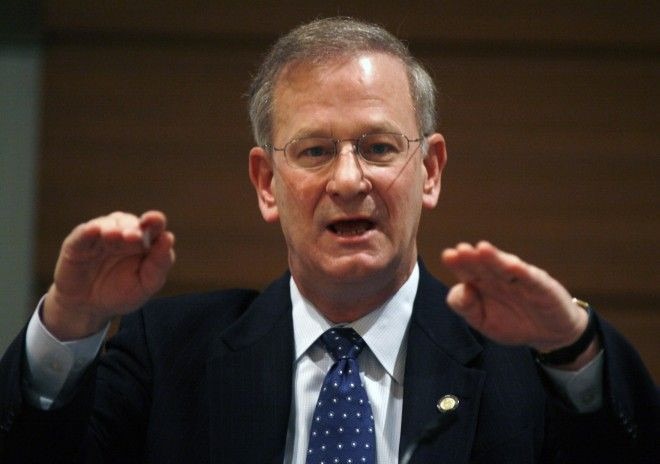Fed's Hoenig: Big banks too risky, rates too low

Wall Street's financial giants continue to pose major risks to the U.S. economy, and must be broken up to avoid another meltdown, Kansas City Federal Reserve Bank President Thomas Hoenig said on Wednesday.
Hoenig also repeated his warning that by promising to keep rates low for a prolonged period the Fed risks sowing the seeds for renewed troubles in the financial sector.
Citing a number of shortcomings in the recently-enacted U.S. financial reform legislation, Hoenig argued that many of the firms whose size helped drive the financial system into crisis are now larger than ever.
He said regulators still lack sufficient powers to rein in financial giants, adding that the government's implicit protection offers them a number of unfair advantages such as low borrowing costs and strong credit ratings.
"We must break up the largest banks, and could do so by expanding the Volcker Rule and significantly narrowing the scope of institutions that are now more powerful and more of a threat to our capitalistic system than prior to the crisis," Hoenig told a meeting of the Women in Housing and Finance.
The so-called Volcker rule, named after former Fed Chairman Paul Volcker who proposed it, puts restrictions on the trading banks can do if it is not for their customers' accounts. The rule was one of several ways a rewrite of financial regulation enacted last year aims to make the financial system safer.
Hoenig has made similar comments in the past about the need to restrict the activities of larger banks. Now that the sweeping Dodd-Frank reforms are law, it does not appear likely his arguments for further curbs will gain traction.
REVISITING GLASS-STEAGALL
The Kansas City Fed chief called for "Glass Steagall-type" provisions -- referring to post-Depression prohibitions that forbade deposit-taking commercial banks from engaging in the riskier activities normally confined to the investment sector.
"We must make sure that large financial organizations are not in position to hold the U.S. economy hostage.
The 1999 Gramm-Leach-Bliley banking law erased many of the divisions between commercial and investment banking that had been in place under the Glass-Steagall Act. Some analysts believe the repeal of Glass-Steagall played a role in the recent financial crisis.
Last year's financial rules rewrite set up a regulatory systemic risk council to police the conduct of firms deemed too big, or too financially interconnected, to fail.
The Fed will oversee these firms, which will likely face higher capital standards, and they could be dismantled by the government if they start to topple. Bank holding companies with assets of $50 billion or more automatically fall under supervision, which means firms such as Goldman Sachs Group Inc and JPMorgan Chase & Co would likely be covered.
STAYING AHEAD OF THE CURVE
Hoenig argued the U.S. economy was improving and said Fed officials must keep in mind monetary policy works with long lags. "You have to calibrate your monetary policy with the recovery in the economy so you don't overshoot and cause the next crisis," he said.He also warned of the dangers in fostering expectations for a long period of ultra-low borrowing costs.
"You shouldn't tell the market that you will have very low interest rates for an extended period of time because it invites speculation," he said. The Fed has said it expects to keep overnight borrowing costs, which are close to zero, "exceptionally low ... for an extended period."
Hoenig has called for rates to be hiked up to 1 percent, a level that he says is still highly stimulative of economic activity. The U.S. economy grew at a 3.2 percent annualized pace in the fourth quarter but the jobless rate, while falling sharply in the last two months, remains elevated at 9 percent.
© Copyright IBTimes 2024. All rights reserved.





















